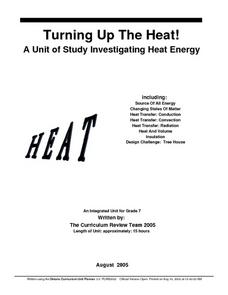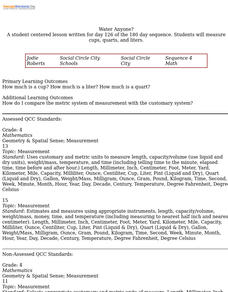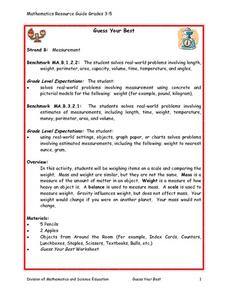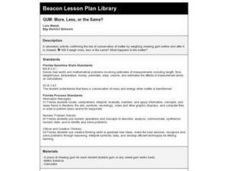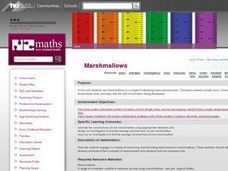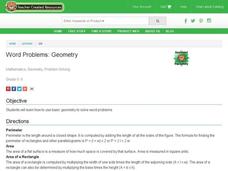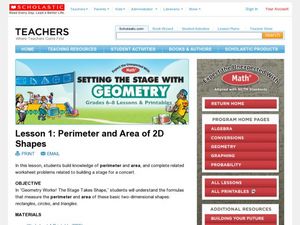Curated OER
Caverns: Drip Rate Analysis
Students tour a cave and collect water samples. They measure the drip rate from several locations inside the cave and discover the part water plays in cave formation.
Curated OER
Pendulum Activity
Fourth graders conduct a lab activity that measures the factors that change the swing rate of a pendulum. They create a hypothesis and test it during the experiment. They record their observations using the recording sheets and journal...
Curated OER
Turning Up The Heat!
Students investigate the properties of heat. They explore methods of temperature control and measurement. Through experimentation and activities, students design a high tech tree house. They consider electrical, solar, and natural heat...
Curated OER
Oranges and Stopwatches
Learners begin to recognize that objects have many measurable attributes. They examine how to identify and accurately measure attributes of common objects. Also Students report their measurement findings.
Pennsylvania Department of Education
The Weight of Things
Learners explore weight. In this math lesson, students predict which item weighs more and discuss how they arrived at their decision. Learners weigh several items to determine which weighs more.
Curated OER
Triangle Explorer
Students compute the area of triangles in a computer program. In this measurement lesson plan, students complete 5 easy, 5 medium, and 5 hard problems.
Curated OER
What Makes Popcorn Pop?
Students experiment with making popcorn to discover what makes it pop. They cook various types to survey which brand gives the highest volume of corn.
Curated OER
How far is a km?
Students explore the size of a kilometer and the time it takes to cover this distance. They develop a concept of a km. They measure a distance of 1 km and the time taken to cover it.
Curated OER
How Many Strips?
Second graders investigate the measurement of 1 meter. They predict and measure how many strips of paper it takes to make exactly one meter. Students devise and use problem solving strategies to solve the problem.
Curated OER
Guess Your Best
Students discuss situations when it is useful to know exact weight of object as opposed to estimated weight, estimate weight of various items, weigh them on scale using ounces and pounds, and compare their weights on Guess Your Best...
Curated OER
Perplexing Perimeters
In the process of constructing their own "rulers" Students develop a sense of the size of a centimeter and meter. Students select the appropriate "ruler" for the tasks. Finally, 3rd graders calculate the perimeter of objects using...
Curated OER
GUM: More, Less, or the Same?
Students confirm the law of conservation of matter by weighing chewing gum before and after it is chewed.
Curated OER
How Close Is Our Estimate?
Fifth graders estimate perimeter, area, and volume. They measure perimeter and area using nonstandard units of measurement. Students add and subtract non-standard units of measurement. They add mixed numbers and simplify the sum.
Curated OER
Marshmallows
Third graders estimate the volume and mass of one marshmallow using appropriate standard units. They design and carry out an investigation to find the average of volume/mass of one marshmallow.
Curated OER
Water and Ice
Students explore what happens to water as it goes from solid to liquid and back. In this state of matter lesson, students observe, measure, and describe water as it changes state.
Curated OER
String of Fish
Fourth graders research a Florida fish to determine its length. They display this information on two index cards, which are cut to the shape of the head and the tail and attached to a string that they measure and cut to the correct...
Curated OER
The Great Cover Up!
Students use non-standard measurement tools such as body parts, beans and counters to find the area of shapes drawn on the floor. They continue to determine the area of other objects in the classroom.
Curated OER
Word Problems: Geometry
Students solve word problems by using basic geometry. In this geometry instructional activity, students use geometric formulas to find the perimeter, area, and volume of objects. Students complete a worksheet.
Curated OER
Average Looking
Students use measurements of their classmates to find the average (means and modes) of their facial features. They use their findings to create a three-dimensional "class head." Examples and assessment materials are included.
Curated OER
Perimeter and Area of 2D Shapes
Learners find the perimeter and area of circles, triangles, and rectangles. In this perimeter and area instructional activity, the teacher gives students formulas for each shape and measurement and works through examples on the board....
Curated OER
Traveling to Japan: Which Way Do We Go?
Fourth graders explore the different types of ways to measure the distance between Florida and Japan.
Curated OER
Efficiency Means Getting More for Less
Students measure water and make predictions about efficiency.
Curated OER
What is a Pico?
Students label objects in their classroom based on mass and volume using the metric system. They examine the relationship between the numerical value and the corresponding metric unit.


